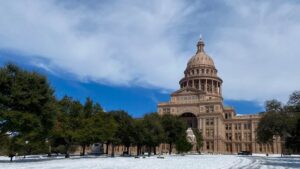Jun 21, 2021 | News
As the Texas chapter of the American Solar Energy Society, TXSES has spent the last four decades working to educate and inspire every Texan to adopt solar energy as part of an equitable 100% clean energy future. But we don’t do it alone. Our five regional chapters in Austin, Dallas, El Paso, Houston and San Antonio are doing extraordinary work, from hosting career fairs to spearheading an initiative to plant one million trees in El Paso in the next decade. Together, they’re helping protect our home planet.
As of June 2021, Texas has 29 million residents. And while our five chapters work hard and reach many, there are many more we haven’t reached. The more chapters we have, the more opportunities we have to spread timely, fact-based solar information – and the last six months have shown how essential this is. Check out the inspiring work our regional chapters do here.
Want to make a difference in your community? Join our TXSES family of regional chapters! Contact TXSES executive director Pete Parsons for more information today.
Jun 21, 2021 | News
by Luke Metzger
More Texans are going solar every day. Texas currently has enough solar energy capacity installed to power the equivalent of more than one million homes.
Yet we’re still not even close to reaching solar’s potential. Every year, enough sunlight shines on Texas to provide 100 times more power than we need. Unfortunately, we’re capturing only a tiny percentage of it. Harnessing more of this power would mean cleaner air and a more stable climate; less strain on natural resources and more resilient communities; and an energy source we can depend on to be virtually pollution-free for as long as we can imagine. And Texans prefer it over any other energy source.
So what’s slowing us down? What, if anything, can stop us?
Well, as the Velvet Underground pointed out “Who loves the sun? Not everyone.” Right now in Texas, we’re thinking too small, failing to update policies that would encourage even more Texans to go solar. We’re also thinking too narrowly, putting the short-term interests of old industries with outdated business models ahead of our health, environment and wellbeing.
Case in point: this past legislative session.
As Texans, including my young family, suffered from blackouts from Winter Storm Uri this February, Governor Abbott went on Fox News’ Hannity show and blamed wind and solar energy for the energy shortages. The Governor changed his tune the next day as state energy regulators made clear natural gas failures were primarily responsible, but the damage was done.
Fossil fuel proponents and their allies in the legislature pushed bills to make wind and solar farms pay potentially billions in fees to provide backup power and interconnect to the grid. The bills would have slammed the brakes on the enormous planned growth of clean energy and led some existing renewable companies to declare bankruptcy. The bills quickly passed the state Senate and we went to work stopping them in the House.
Stopping these attacks was Environment Texas’ top legislative priority. Working closely with the renewable energy industry and other allies, we worked to debunk myths about the blackouts. We alerted the media about the threat to wind and solar energy and were quoted in the Austin American-Statesman, the Dallas Morning News, Bloomberg, The Economist, and other prominent outlets. Our lobbyist, as well as dozens of student activists from across the state, made our case directly to lawmakers. Our call center and digital organizers generated thousands of phone calls and emails into the offices of key lawmakers. We produced a video that was seen more than 300,000 times on Facebook and via mobile phone ads in key districts.
Legislators, including state Reps. Donna Howard, Erin Zwiener, and many others lobbied their colleagues, identified points of order to slow, kill or modify bills, and stood up for wind and solar.
Ultimately, none of the bills became law! So while we were able to stop the bad – which is a big deal – we missed huge opportunities to take proactive steps to advance solar.
However, there were some modest steps forward for solar. SB 398 (Menendez/Deshotel), aka the Solar Customer Protection Act, preempts cities from adopting anti-solar policies (e.g., the city of Allen’s prohibition on street-facing solar should be preempted by state law). SB 1772 (Zaffirini/Zwiener/Cyrier) will help solar developers install pollinator-friendly landscaping at solar farms. And SB 415 (Hancock/Holland) allows electric utilities in the deregulated market to invest in battery storage.
With the 87th Legislature in the books, we’ll now return our focus to other forums to promote solar, including asking Congress to extend solar tax credits for the long-term and asking Texas cities to adopt solar-ready standards on new buildings.
To end on a more positive musical note, “Here comes the sun, and I say it’s all right.”
Luke Metzger is Executive Director, Environment Texas
Apr 13, 2021 | News

BREAKING: Build San Antonio Green, our San Antonio TXSES chapter, receives the 2021 ENERGY STAR Partner of the Year Award from the U.S. Environmental Protection Agency and the U.S. Department of Energy!
Each year, EPA honors a group of businesses and organizations that have made outstanding contributions to protecting the environment through superior energy efficiency achievements. Whether a first-time Partner of the Year winner or a Sustained Excellence winner for many years, these ENERGY STAR award-winning partners from across the country demonstrate that delivering real climate solutions makes good business sense and strengthens our economy.
And during #earthmonth!!! 



See full list of awardees here. Congrats to all!!!
Mar 3, 2021 | News
The Texas Solar Energy Society (TXSES) today announced it has received a $75,000 grant from the Texas-based Meadows Foundation. These funds will support TXSES’s mission to ensure equitable access to solar energy for every Texan.
“We are so appreciative of the generous support from The Meadows Foundation,” said Patrice ‘Pete’ Parsons, TXSES Executive Director. “These funds will enable TXSES to leverage its renowned educational and outreach expertise that will support ambitious clean energy and carbon reduction goals, enhance the resilience and reliability of the grid and build strong, well-informed solar communities throughout Texas.”
The grant funds will support:
- a statewide Solar Energy Internship Program (SEIP) to facilitate pathways to jobs and opportunities in solar energy for female students and students of color
- community solar opportunities for low-income and multi-family properties
- establish two additional TXSES chapters in Midland/Odessa and Edinburg/Hidalgo counties, representing more than one million Texans
About The Meadows Foundation
Established in 1948 by Algur H. and Virginia Meadows, The Meadows Foundation exists to assist the people and institutions of Texas improve the quality and circumstances of life for themselves and future generations. The Foundation has disbursed more than $1.25 billion to 3,600 Texas institutions and agencies across Texas. Grants are awarded to 501(c)(3) organizations and public entities in the areas of arts and culture, civic and public affairs, education, health, and human services as well as initiatives promoting the environment, mental health, and public education. For additional information, visit www.mfi.org.
Feb 22, 2021 | News
 February 22, 2021
February 22, 2021
Excerpted from pvmagazine
By David Brearley, TXSES Board Member
As my wife and I melted snow this past week to flush the toilets in our 100-year-old East Austin home, located a short walking distance from the Texas State Capitol, it occurred to me more than once that the slope from pride to hubris is slippery and treacherous, much like the steps out our front door and streets all across our frozen and paralyzed state.

Texas capitol. Image: David Brearley
For three days we had no heat or power as overnight lows fell to 5°F (-15°C). A week later, line crews were still restoring power to some homes and businesses.
Cruel metrics
Based on a cruel combination of metrics, the Arctic air that wobbled down from the North Pole and parked itself over Texas is a clear contender for the worst winter storm in a century.
- In terms of severity, few winter storms over the past 100 years have notched colder freezing temperatures.
- In terms of duration, few freeze events have lasted as long without breaking.
- In terms of extent, for the first time ever all 254 counties in Texas—a state that is two time zones wide—were simultaneously subject to a winter storm warning. It was colder in Dallas, Texas, than in Anchorage, Alaska.
This was a record-breaking storm that likely inflicted record-insured losses. Many insurance industry experts and associations already project that this winter storm will constitute the largest insurance claim event in Texas history, both in terms of the cumulative number and the total value of claims.
Read the article in its entirety.


 February 22, 2021
February 22, 2021